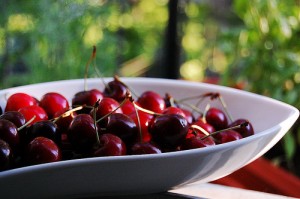The Dirty Dozen & How to Clean Them Up

Credit: Saucy Salad
A few weeks ago Erin reviewed this eye-opening book. While we’ve already discussed the book itself, we thought that some of its information was too good not to share with the FBG masses. Including publishing the author’s so-called “dirty dozen” that are highest in pesticides and are also sadly all FBG’s favorites: apples, bell peppers, carrots, celery, cherries, imported grapes, kale, lettuce, nectarines, peaches, pears and strawberries. Sad face!
But don’t worry. While it’s best to buy organic, if you can’t spend the extra money or don’t have access to a farmer’s market or an organic grocery store, you can detoxify produce by following the directions below!
If you can’t find organic varieties, use these methods to reduce your toxic exposure:
- Use a vegetable peeler to remove the skin from commercial varieties of apples, pears, nectarines and potatoes. You’ll probably need a paring knife to peel peaches.
- For bell peppers, apples and celery, use an acid wash:
- Fill a large bowl or a plastic food storage container with water.
- Add a cup of distilled vinegar.
- Let the produce rest in the tub for 10 to 25 minutes, and then use a vegetable scrub brush to scrub each piece for about 60 seconds.
- For grapes and cherries, just let them soak for about 60 minutes.
The clean dozen you don’t have to worry about buying organic? Asparagus, avocados, cabbage, eggplant, kiwi, mangoes, onions, papayas, pineapples, sweet corn, sweet peas and watermelon. Woo-hoo—those are tasty, too!
Do you wash your veggies thoroughly? Only buy organic? Tell us about it in the comments! —Jenn
Some of the above text is an excerpt from the book Clean, Green, and Lean: Get Rid of the Toxins That Make You Fat by Dr. Walter Crinnion. Reprinted by permission of the publisher, John Wiley & Sons, Inc., from Clean, Green & Lean, by Walter Crinnion. Copyright © 2010 by Walter Crinnion.

Comments
I love all the information…and I hate to admit this, but I never wash my fruits and veggies. I wash carrots and potatoes but that’s it. :O
I’m a little dismayed to see sweet corn on the Safe list – I’m pretty sure I’ve heard that most commercially available corn in the United States is genetically modified, and this has not had any sort of long term testing to validate any safety claims. Those documentaries about our food supply are pretty frightening.
I try to only buy organic produce and local if possible. I also make a point to only buy organically raised meat products and wild fish. Not only is this the healthest choice by far, it also sends a message to the store that organic products are important to me…in other words, I communicate with my $$, which unfortunately is the only thing the stores and food industry seem to care about – you know, as opposed to people’s health.
The only exception is restaurants, where unless the restaurant makes a point of telling you on the menu, you never know where it came from or how it was grown. We really need more restaurants that offer organic products (both meats and produce).
Comments are closed.